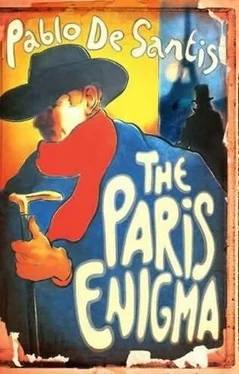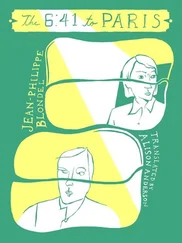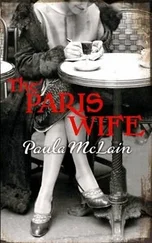The animosity between the two detectives was a delicate and unpleasant topic, and the assistants were silent, pondering the consequences of that distant episode. I felt a bit ashamed for having taken the conversation in that direction.
Luckily Benito broke the silence. “But they are also divided by theoretical concerns. I’ve heard that Castelvetia maintains that an assistant, under certain circumstances, could be promoted.”
“That’s enough, Benito, we’ve already discussed that,” said Linker. “Don’t dream the impossible dream. They are The Twelve, not The Twenty-four. Who’s ever heard of an assistant who was promoted? Nobody.”
“But maybe the laws state that-”
“And who’s ever seen the laws? They’re unwritten; the detectives only make veiled references to them when they’re alone. They won’t tell them to you, or to me. It doesn’t make any sense to argue about something we’ve never seen, and never will.”
“But I have seen them,” said Okano, the Japanese assistant. His voice, in spite of being barely the whisper of silk paper, made us all jump. “I’ve seen the rules.”
Linker attributed his claim to a language problem. “Do you know what we’re talking about?”
Okano responded in perfect French. He was more f luent than Linker.
“My mentor is very methodical; and any time he received a correspondence about the laws, he wrote it in a separate place. I had a chance to read the papers before he burned them.”
“He burned the laws?”
“So no one else could see them. He burned them in the garden of an inn where we were staying during an investigation in a southern town. It was summertime and the cicadas were singing. My mentor burned the papers in a stone lantern.”
“Do you mean to say that you read something about an assistant becoming a detective?”
“That’s right. My mentor didn’t ask me to keep it a secret, so I’ll dare to speak. I even think Sakawa allowed me to read those papers on purpose, so I would know that the remote possibility exists, and so someday you all would know it as well. Knowing that means we have to be better assistants. Not because we have ambitions of becoming detectives, but because the mere fact it could happen exalts us.”
This was much more than the Japanese assistant had said in any of the other sessions, and now he was visibly short of breath. He was drinking a glass of pure absinthe, which was probably the reason for his sudden loquacity. But now the green fairy seemed to have abandoned him. Linker grew impatient.
“Come on, tell us. How is it done?”
Okano squinted his eyes, as if he were recalling something that had happened long ago.
“Four rules have been established for the promotion from assistant to detective. The first is that the detective, on his voluntary retirement, has to nominate his assistant as his replacement. He must be willing to give him his good name and his archives as well. The assistant would carry on his mentor’s work, as if he were the same detective. Nine of the eleven other members must approve the appointment. That’s the rule of inheritance.”
“And the second one?”
“The second tenet is called the rule of unanimity. That is when all the detectives agree to fill an empty chair by naming an assistant whom they deem exceptional on the basis of his performance.”
“And the third?”
“That’s the rule of prepotency. When a mystery has stumped three detectives and there is an assistant who is able to solve the case, he can present his application for membership. Their incorporation into the club is subject to a vote, in which two thirds of all the members, not just those present, must agree.”
Benito smiled, pleased with his victory.
“What now, Linker? Was I right or not?”
Linker looked at him with irritation.
“But those are hypothetical situations. Pure theory. In practice none of those three rules have ever been applied. But… didn’t you say there were four?”
Okano now regretted that he had said so much. Baldone held up the little green bottle and Okano looked at his empty glass. He had to talk to get his reward.
“There was a fourth rule, which my mentor called the rule of inevitable betrayal. But Sakawa didn’t write anything more on that sheet of paper, as if he found it so shocking that not even the burning f lames could remove the stink of sacrilege. All the clauses are secret, but that one is twice as secret.”
Everyone had fallen silent. Baldone poured two fingers of absinthe into Okano’s glass. He drank it straight. Soon he fell asleep.
“Dream,” said Linker. “Dream of secret clauses and rules whispered into ears. Dream of papers burning in the stone lantern of a Japanese garden.”
I said good night to the acolytes and I went up to my room.
The next morning I was awakened by banging on the door.
“Get up, assistant! You have the right to sleep late only when you’ve been out investigating all night.”
It was Arzaky’s voice. I jumped out of bed and started getting dressed. I told him to come in because I didn’t want to make him wait outside.
“I envy those gleaming boots.”
“I shined them last night.”
“I have mine shined, but they never look that good.”
“I polish my boots with a special cream that my father makes. It’s his secret formula.” I opened my shoeshine box and showed him the jar, whose blue label showed a picture of a shoe and the name Salvatrio. “Do you want some? It’s perfect for when it rains. My father says that it can cure injuries too.”
The detective took the jar, opened it, and breathed in the cream’s smoky odor.
“You put the shoe polish on a wound? I don’t trust your father that much.”
Arzaky moved some papers off of the only chair in the room and sat down.
“I can make your boots shine like mine.”
“You can? Please do.”
I looked in the shoeshine box for a blackened rag and a sable-hair brush. I sat on the f loor and covered the boots with polish and then brushed them vigorously. They soon shone with the blue gleam characteristic of Salvatrio polish.
“I think deep down you’re ashamed that your father is a shoemaker.”
“He works hard. I have nothing to be ashamed of.”
“But you don’t mention it either. Do you think all the other assistants come from aristocratic families?”
“I guess not. If they did, they wouldn’t be assistants. They’d be detectives.”
“Is that what you think? The detectives don’t come from important families either.”
“Doesn’t Magrelli come from Roman aristocracy? I read that somewhere. Castelvetia has a noble title, count or duke, and the Hatters own the largest newspapers in Germany…”
“Counts, dukes, millionaires, relatives of the pope… I’m afraid we fall very short of your fantasies. Magrelli’s father was a Roman policeman. Zagala grew up in a fishing village and his mother died in a famous storm that destroyed half the ships in port. Castelvetia gave himself a title, but it’s fake. The Hatter family used to own a small press in Nuremberg; they printed commercial stationery and wedding invitations. The others I can’t recall, I don’t know them as well, but I can assure you that Madorakis isn’t the heir to the Greek throne, and that good old Novarius used to hawk newspapers on the street. And as for me, I’m a bastard.”
I started, almost imperceptibly, but Arzaky noticed it.
“Don’t worry, I’m not going to tell you any big secret that might threaten your sense of decency. My mother, when she was very young, had an affair with the town priest. The priest stayed in his parish, but she was forced to leave, taking her sin along with her. The boy was never baptized. After she moved, my mother had to make up a last name for me. She thought about killing herself, cutting her wrists with the sharp knife she always carried. She read the brand engraved into the steel and that was the name she gave me: Arzaky. Arzaky knives were very common in those days. I understand that in Argentina you are very Catholic…”
Читать дальше












